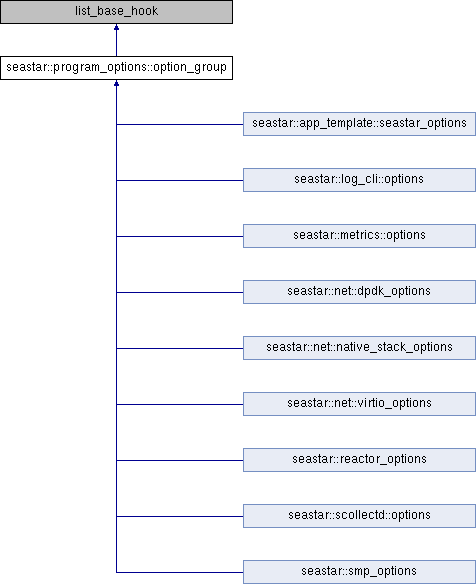Detailed Description
A group of options.
option_group is the basis for organizing options. It can hold a number of basic_value objects. These are typically also its members:
struct my_option_group : public option_group {
value<> opt1;
value<bool> opt2;
...
my_option_group()
: option_group(nullptr, "My option group")
, opt1(this, "opt1", ...
, opt2(this, "opt2", ...
, ...
{ }
};
Option groups can also be nested and using this property one can build a tree of option groups and values. This tree then can be visited using the two visitor methods exposed by option_group:
Using these two visitors one can easily implement glue code to expose an entire options tree to the command line. Use describe() to build the command-line level description of the objects (using e.g. boost::program_options) and after parsing the provided command-line options use mutate() to propagate the extracted values back into the options tree. How this is done is entirely up to the visitors, the above methods only offer an API to visit each group and value in the tree, they don't make any assumption about how the visitor works and what its purpose is.
#include <seastar/util/program-options.hh>

Public Types | |
| using | value_list_type = boost::intrusive::list< basic_value, boost::intrusive::base_hook< list_base_hook >, boost::intrusive::constant_time_size< false > > |
| using | option_group_list_type = boost::intrusive::list< option_group, boost::intrusive::base_hook< list_base_hook >, boost::intrusive::constant_time_size< false > > |
Public Member Functions | |
| option_group (option_group *parent, std::string name) | |
| option_group (option_group *parent, std::string name, unused) | |
| option_group (option_group &&) | |
| option_group (const option_group &)=delete | |
| option_group & | operator= (option_group &&)=delete |
| option_group & | operator= (const option_group &)=delete |
| operator bool () const | |
| Does the option group has any values contained in it? | |
| bool | used () const |
| const std::string & | name () const |
| const value_list_type & | values () const |
| value_list_type & | values () |
| void | describe (options_descriptor &descriptor) const |
| void | mutate (options_mutator &mutator) |
Constructor & Destructor Documentation
◆ option_group() [1/2]
|
explicit |
Construct an option group.
- Parameters
-
parent - the parent option-group, this option group will become a sub option group of the parent group name - the name of the option group
◆ option_group() [2/2]
|
explicit |
Construct an unused option group.
- Parameters
-
parent - the parent option-group, this option group will become a sub option group of the parent group name - the name of the option group
Member Function Documentation
◆ describe()
| void seastar::program_options::option_group::describe | ( | options_descriptor & | descriptor | ) | const |
Describe the content of this option group to the visitor.
The content is visited in a depth-first manner:
- First the option groups itself is visited with options_descriptor::visit_group_start(). If this returns
falsethe entire content of the group, including all its subgroups and values are skipped and options_descriptor::visit_group_end() is called immediately. Otherwise visiting the content of the group proceeds. - All the values contained therein are visited. For each value the following happens:
- First options_descriptor::visit_value_metadata() is called with generic metadata that all values have. If this return
falsethe value is skipped, otherwise visiting the value proceeds. - Then the appropriate overload of options_descriptor::visit_value() is called, with a pointer to the default value of the respective value. The pointer is null if there is no default value.
- For selection_value, options_descriptor::visit_selection_value() will be called instead of options_descriptor::visit_value(). After the value is visited, the option_group instance belonging to each candidate (if set) will be visited.
- First options_descriptor::visit_value_metadata() is called with generic metadata that all values have. If this return
- All the nested option_group instances in the current group are visited.
- Finally options_descriptor::visit_group_end() is called.
◆ mutate()
| void seastar::program_options::option_group::mutate | ( | options_mutator & | mutator | ) |
Mutate the content of this option group by the visitor.
The visiting algorithm is identical to that of describe(), with the following differences:
- options_mutator::visit_value() is allowed to mutate the value through the passed-in reference. It should return
trueif it did so andfalseotherwise. - When visiting a selection value, only the nested group belonging to the selected value is visited afterwards.
The documentation for this class was generated from the following file:
- seastar/util/program-options.hh